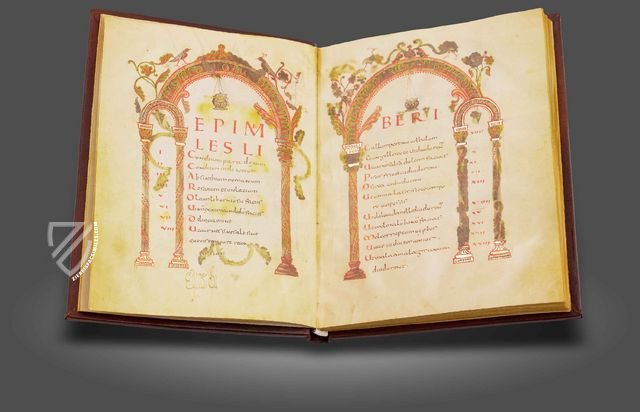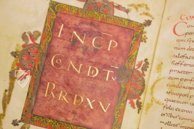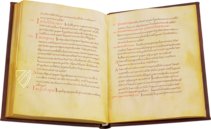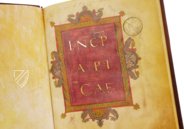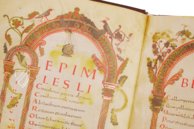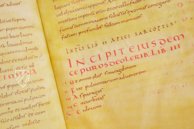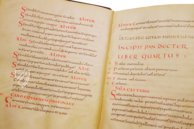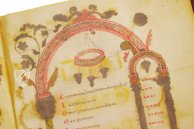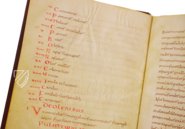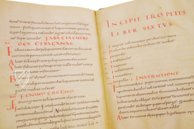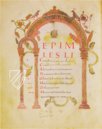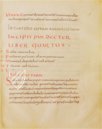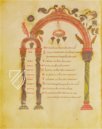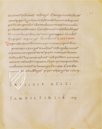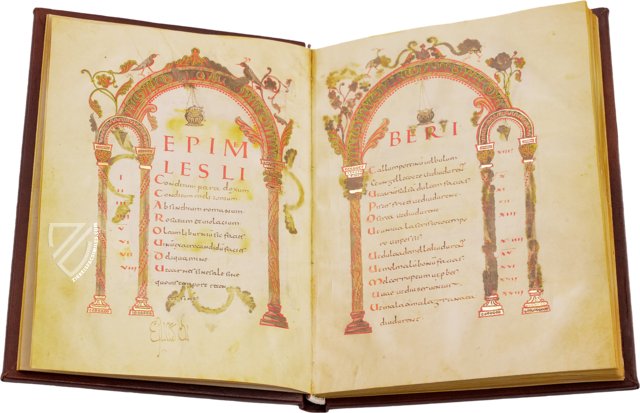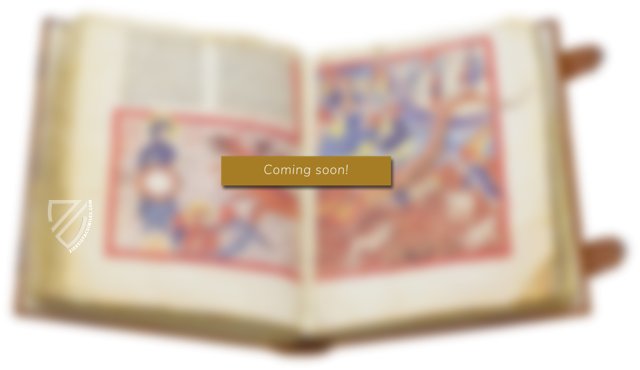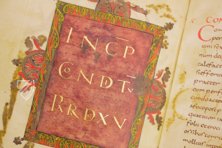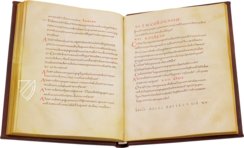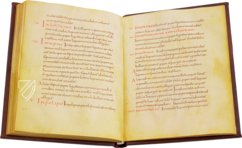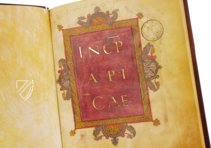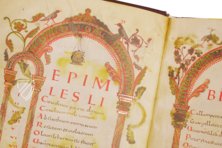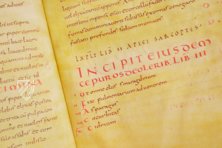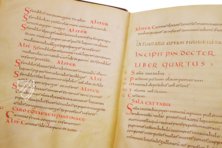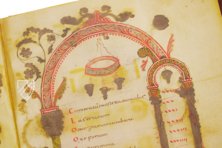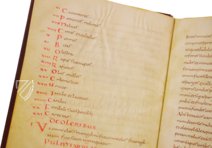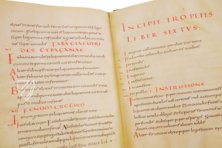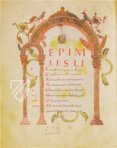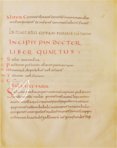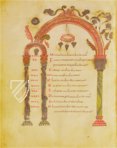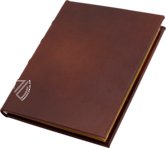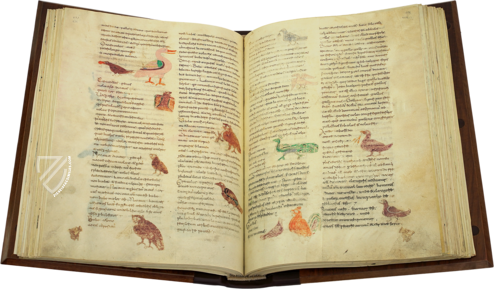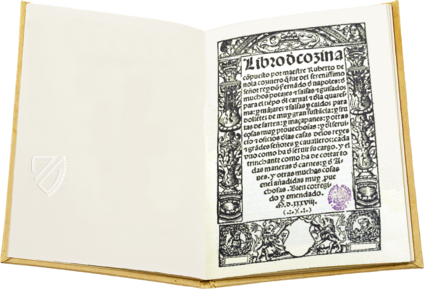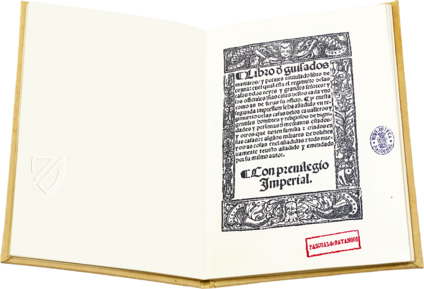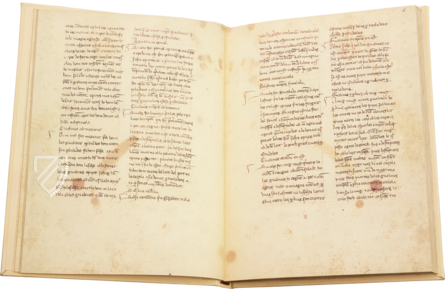Apicius - De re coquinaria
(1,000€ - 3,000€)
The famous Roman cookbook by Apicius in one of only two surviving 9th century manuscripts! The 1st century work by the Roman gourmet Apicius is steeped in history and was probably supplemented and streamlined in the 4th century and is considered today to be a priceless testimonial to Roman cuisine and culture. This splendid manuscript was created around the middle of the 9th century in the famous scriptorium of St. Martin de Tours, which presents the text of Apicius in a luxurious edition. A wonderful historical inside view and still a feast today for modern gourmets!
Apicius - De re coquinaria
The famous Roman cookbook by Apicius in one of only two surviving 9th century manuscripts! The 1st century work by the Roman gourmet Apicius is steeped in history and was probably supplemented and streamlined in the 4th century and is considered today to be a priceless testimonial to Roman cuisine and culture. This splendid manuscript was created around the middle of the 9th century in the famous scriptorium of St. Martin de Tours, which presents the text of Apicius in a luxurious edition. A wonderful historical inside view and still a feast today for modern gourmets!
The Cuisine of Ancient Rome
Stuffed dormice, pig teats, vegetable gratin and asparagus pancakes, fried rays and fish sauce. All of this and more delicacies both typical and unusual are assembled in the cook book by Apicius, De re coquinaria. The text is attributed to a certain Caelius Apicius, a Roman gourmet from the 1st century. Having said this, this name has been handed down and attributed to at least three people in the most varied of sources – Seneca, Tacitus, and in the Historia Augusta – who were considered to be gourmets and who could be associated with the text of the cookbook. The name Apicius was a quasi-synonym for a gourmet in ancient Rome.
A First-Century Cookbook in a Carolingian Manuscript
The oldest surviving cookbook of Roman antiquity is attributed to this Apicius. This collection of 400 recipes is a continuously appended collection of recipes, which was presumably begun in the 1st century and was completed sometime in the 3rd or 4th century. De re coquinaria is a manual for all social classes, containing both everyday recipes as well as fine cuisine. Sauce recipes receive special attention, but numerous complete meals are also depicted. Today, the work only survives in Carolingian manuscripts.
A Coveted Collector’s Item
The famous manuscript of Apicius’ cookbook in the Biblioteca Apostolica Vaticana is a work of Carolingian illumination. It originated in the years 843–851 in the trailblazing scriptorium of St. Martin de Tours. This luxurious edition with its lavish adornment and abundant use of gold was probably a gift for Charles the Bald (823–877). The manuscript finally made its way to Bologna by 1464 and was then acquired by the library of the Dukes of Urbino. Duke Guidobaldo loaned the magnificent cookbook to Angelo Poliziano (who wanted to compare it with his own Apicio, which is found today in St. Petersburg). It came into the Biblioteca Vaticana in 1658 as a part of the library of the Duke of Urbino, it is stored there today under the shelf mark Urb.lat. 1146.
Codicology
- Alternative Titles
- On the Subject of Cooking
Über die Kochkunst
Apicio - De Re Coquinaria - Size / Format
- 124 pages / 23.5 × 19.0 cm
- Origin
- France
- Date
- 843–851
- Epochs
- Style
- Language
- Script
- Carolingian minuscule Roman Uncial
- Illustrations
- 2 pages with purple frames and script in gold ink, 4 pages with a table of contents presented in classically-styled arches
- Content
- Collection of Roman cookery recipes and more divided into ten chapters: On Housekeeping, Minced Meats, Vegetables, Other Ingredients, Legumes, Poultry, Gourmet, Quadrupeds, Seafoods, On Fishing
- Patron
- Abbot Vivian
- Artist / School
- Caelius Apicius (author)
- Previous Owners
- Charles the Bald
Angelo Poliziano
Federico de Montefeltro, Duke of Urbino
Guidobaldo Il Della Rovere, Duke of Urbino
Giovanni Andreoli
Lorenzo Brancati
Pope Innocent XII
Apicius - De re coquinaria
Incipit Page – First Chapter
Chapter 1 of this manuscript is introduced by a splendid incipit page created with only the finest and most expensive materials – green, red, and yellow palmettes, purple dye for the parchment, and gold ink for the text. The incipit introduces a recipe for Conditum Paradoxum, which roughly translates to “surprise spiced wine”. It is a family of spiced wines favored by the Romans whose ingredients included wine, honey, pepper, mastic, laurel, saffron, date seeds, and dates soaked in wine.
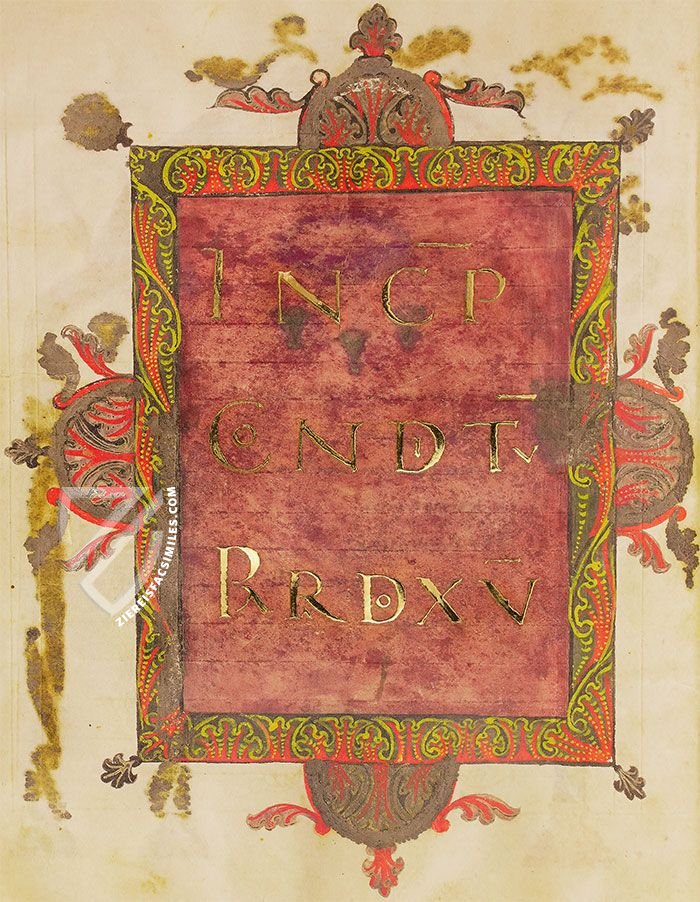
Apicius - De re coquinaria
Table of Contents
Four pages with architectural frames resembling Eusebian canon tables present the manuscript’s table of contents. The title of the first book in large red letters is incomplete without the opposite page: Epimeles Li[beri] or “The Careful Housekeeper”. The grey elements are actually tarnished silver, which would have originally shone alongside the gold on the page.
Decorative arcades with stylized foliage, birds, and hanging lamps rest on fine columns with ornate acanthus capitals. The use of a double arch, with the smaller of the arches containing the Roman numerals for each chapter, is quite unique and together with the square shape of the pages indicates that this manuscript was closely modelled on an ancient original.
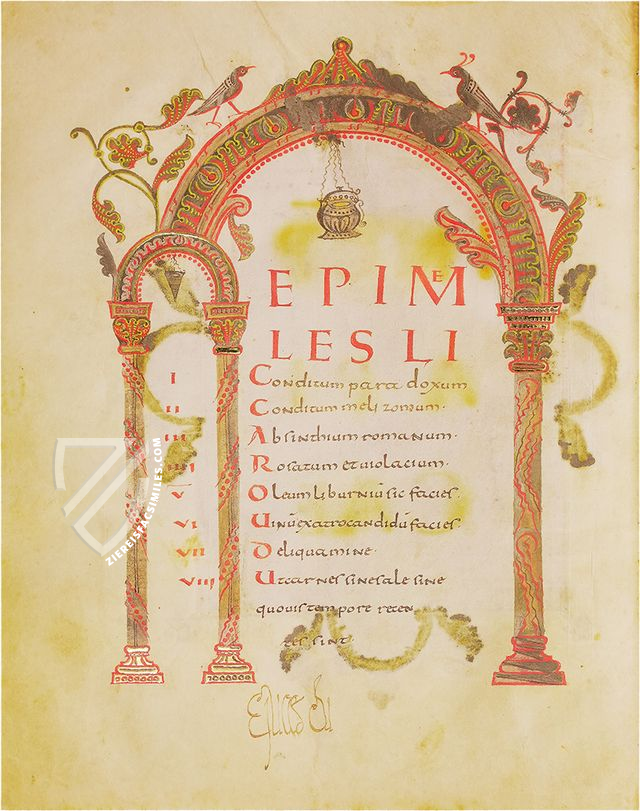
#1 Apicio - De re coquinaria (Leather edition)
Language: Italian
(1,000€ - 3,000€)
- Treatises / Secular Books
- Apocalypses / Beatus
- Astronomy / Astrology
- Bestiaries
- Bibles / Gospels
- Chronicles / History / Law
- Geography / Maps
- Saints' Lives
- Islam / Oriental
- Judaism / Hebrew
- Single Leaf Collections
- Leonardo da Vinci
- Literature / Poetry
- Liturgical Manuscripts
- Medicine / Botany / Alchemy
- Music
- Mythology / Prophecies
- Psalters
- Other Religious Books
- Games / Hunting
- Private Devotion Books
- Other Genres
- Afghanistan
- Armenia
- Austria
- Belgium
- Belize
- Bosnia and Herzegovina
- China
- Colombia
- Costa Rica
- Croatia
- Cyprus
- Czech Republic
- Denmark
- Egypt
- El Salvador
- Ethiopia
- France
- Germany
- Greece
- Guatemala
- Honduras
- Hungary
- India
- Iran
- Iraq
- Israel
- Italy
- Japan
- Jordan
- Kazakhstan
- Kyrgyzstan
- Lebanon
- Liechtenstein
- Luxembourg
- Mexico
- Morocco
- Netherlands
- Palestine
- Panama
- Peru
- Poland
- Portugal
- Romania
- Russia
- Serbia
- Spain
- Sri Lanka
- Sweden
- Switzerland
- Syria
- Tajikistan
- Turkey
- Turkmenistan
- Ukraine
- United Kingdom
- United States
- Uzbekistan
- Vatican City
- A. Oosthoek, van Holkema & Warendorf
- Aboca Museum
- Ajuntament de Valencia
- Akademie Verlag
- Akademische Druck- u. Verlagsanstalt (ADEVA)
- Aldo Ausilio Editore - Bottega d’Erasmo
- Alecto Historical Editions
- Alkuin Verlag
- Almqvist & Wiksell
- Amilcare Pizzi
- Andreas & Andreas Verlagsbuchhandlung
- Archa 90
- Archiv Verlag
- Archivi Edizioni
- Arnold Verlag
- ARS
- Ars Magna
- Art Market
- ArtCodex
- AyN Ediciones
- Azimuth Editions
- Badenia Verlag
- Bärenreiter-Verlag
- Belser Verlag
- Belser Verlag / WK Wertkontor
- Benziger Verlag
- Bernardinum Wydawnictwo
- BiblioGemma
- Biblioteca Apostolica Vaticana (Vaticanstadt, Vaticanstadt)
- Bibliotheca Palatina Faksimile Verlag
- Bibliotheca Rara
- Boydell & Brewer
- Bramante Edizioni
- Bredius Genootschap
- Brepols Publishers
- British Library
- C. Weckesser
- Caixa Catalunya
- Canesi
- CAPSA, Ars Scriptoria
- Caratzas Brothers, Publishers
- Carus Verlag
- Casamassima Libri
- Centrum Cartographie Verlag GmbH
- Chavane Verlag
- Christian Brandstätter Verlag
- Circulo Cientifico
- Club Bibliófilo Versol
- Club du Livre
- CM Editores
- Collegium Graphicum
- Collezione Apocrifa Da Vinci
- Comissão Nacional para as Comemorações dos Descobrimentos Portugueses
- Coron Verlag
- Corvina
- CTHS
- D. S. Brewer
- Damon
- De Agostini/UTET
- De Nederlandsche Boekhandel
- De Schutter
- Deuschle & Stemmle
- Deutscher Verlag für Kunstwissenschaft
- DIAMM
- Dropmore Press
- Droz
- E. Schreiber Graphische Kunstanstalten
- Ediciones Boreal
- Ediciones Grial
- Ediclube
- Edições Inapa
- Edilan
- Editalia
- Edition Deuschle
- Edition Georg Popp
- Edition Leipzig
- Edition Libri Illustri
- Editiones Reales Sitios S. L.
- Éditions de l'Oiseau Lyre
- Editions Medicina Rara
- Editorial Casariego
- Editorial Mintzoa
- Editrice Antenore
- Editrice Velar
- Edizioni Edison
- Egeria, S.L.
- Eikon Editores
- Electa
- Emery Walker Limited
- Enciclopèdia Catalana
- Eos-Verlag
- Ephesus Publishing
- Ernst Battenberg
- Eugrammia Press
- Extraordinary Editions
- Fackelverlag
- Facsimila Art & Edition
- Facsimile Editions Ltd.
- Facsimilia Art & Edition Ebert KG
- Faksimile Verlag
- Feuermann Verlag
- Folger Shakespeare Library
- Franco Cosimo Panini Editore
- Friedrich Wittig Verlag
- Fundación Hullera Vasco-Leonesa
- G. Braziller
- Gabriele Mazzotta Editore
- Gebr. Mann Verlag
- Gesellschaft für graphische Industrie
- Getty Research Institute
- Giovanni Domenico de Rossi
- Giunti Editore
- Graffiti
- Grafica European Center of Fine Arts
- Guido Pressler
- Guillermo Blazquez
- Gustav Kiepenheuer
- H. N. Abrams
- Harrassowitz
- Harvard University Press
- Helikon
- Hendrickson Publishers
- Henning Oppermann
- Herder Verlag
- Hes & De Graaf Publishers
- Hoepli
- Holbein-Verlag
- Houghton Library
- Hugo Schmidt Verlag
- Idion Verlag
- Il Bulino, edizioni d'arte
- ILte
- Imago
- Insel Verlag
- Insel-Verlag Anton Kippenberger
- Instituto de Estudios Altoaragoneses
- Instituto Nacional de Antropología e Historia
- Introligatornia Budnik Jerzy
- Istituto dell'Enciclopedia Italiana - Treccani
- Istituto Ellenico di Studi Bizantini e Postbizantini
- Istituto Geografico De Agostini
- Istituto Poligrafico e Zecca dello Stato
- Italarte Art Establishments
- Jan Thorbecke Verlag
- Johnson Reprint Corporation
- Johnson Reprint Corporation
- Josef Stocker
- Josef Stocker-Schmid
- Jugoslavija
- Karl W. Hiersemann
- Kasper Straube
- Kaydeda Ediciones
- Kindler Verlag / Coron Verlag
- Kodansha International Ltd.
- Konrad Kölbl Verlag
- Kurt Wolff Verlag
- La Liberia dello Stato
- La Linea Editrice
- La Meta Editore
- Lambert Schneider
- Landeskreditbank Baden-Württemberg
- Leo S. Olschki
- Les Incunables
- Liber Artis
- Library of Congress
- Libreria Musicale Italiana
- Lichtdruck
- Lito Immagine Editore
- Lumen Artis
- Lund Humphries
- M. Moleiro Editor
- Maison des Sciences de l'homme et de la société de Poitiers
- Manuscriptum
- Martinus Nijhoff
- Maruzen-Yushodo Co. Ltd.
- MASA
- Massada Publishers
- McGraw-Hill
- Metropolitan Museum of Art
- Militos
- Millennium Liber
- Müller & Schindler
- Nahar - Stavit
- Nahar and Steimatzky
- National Library of Wales
- Neri Pozza
- Nova Charta
- Oceanum Verlag
- Odeon
- Omnia Arte
- Orbis Mediaevalis
- Orbis Pictus
- Österreichische Staatsdruckerei
- Oxford University Press
- Pageant Books
- Parzellers Buchverlag
- Patrimonio Ediciones
- Pattloch Verlag
- PIAF
- Pieper Verlag
- Plon-Nourrit et cie
- Poligrafiche Bolis
- Presses Universitaires de Strasbourg
- Prestel Verlag
- Princeton University Press
- Prisma Verlag
- Priuli & Verlucca, editori
- Pro Sport Verlag
- Propyläen Verlag
- Pytheas Books
- Quaternio Verlag Luzern
- Reales Sitios
- Recht-Verlag
- Reichert Verlag
- Reichsdruckerei
- Reprint Verlag
- Riehn & Reusch
- Roberto Vattori Editore
- Rosenkilde and Bagger
- Roxburghe Club
- Salerno Editrice
- Saltellus Press
- Sandoz
- Sarajevo Svjetlost
- Schöck ArtPrint Kft.
- Schulsinger Brothers
- Scolar Press
- Scrinium
- Scripta Maneant
- Scriptorium
- Shazar
- Siloé, arte y bibliofilia
- SISMEL - Edizioni del Galluzzo
- Sociedad Mexicana de Antropología
- Société des Bibliophiles & Iconophiles de Belgique
- Soncin Publishing
- Sorli Ediciones
- Stainer and Bell
- Studer
- Styria Verlag
- Sumptibus Pragopress
- Szegedi Tudomànyegyetem
- Taberna Libraria
- Tarshish Books
- Taschen
- Tempus Libri
- Testimonio Compañía Editorial
- TGB Limited Editions
- Thames and Hudson
- The Clear Vue Publishing Partnership Limited
- The Facsimile Codex
- The Folio Society
- The Marquess of Normanby
- The Richard III and Yorkist History Trust
- Tip.Le.Co
- TouchArt
- TREC Publishing House
- TRI Publishing Co.
- Trident Editore
- Tuliba Collection
- Typis Regiae Officinae Polygraphicae
- Union Verlag Berlin
- Universidad de Granada
- Universitaire Bibliotheken Leiden
- University of California Press
- University of Chicago Press
- Urs Graf
- Vallecchi
- Van Wijnen
- VCH, Acta Humaniora
- VDI Verlag
- VEB Deutscher Verlag für Musik
- Verlag Anton Pustet / Andreas Verlag
- Verlag Bibliophile Drucke Josef Stocker
- Verlag der Münchner Drucke
- Verlag für Regionalgeschichte
- Verlag Styria
- Vicent Garcia Editores
- W. Turnowski Ltd.
- W. Turnowsky
- Waanders Printers
- Wiener Mechitharisten-Congregation (Wien, Österreich)
- Wissenschaftliche Buchgesellschaft
- Wissenschaftliche Verlagsgesellschaft
- Wydawnictwo Dolnoslaskie
- Xuntanza Editorial
- Zakład Narodowy
- Zollikofer AG

